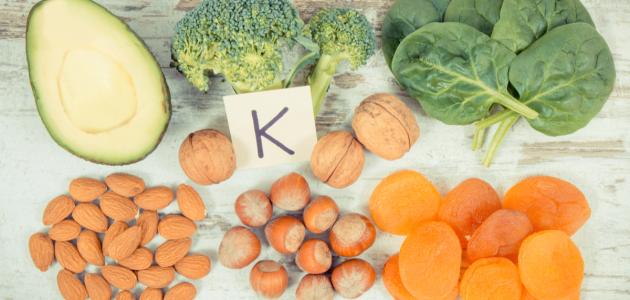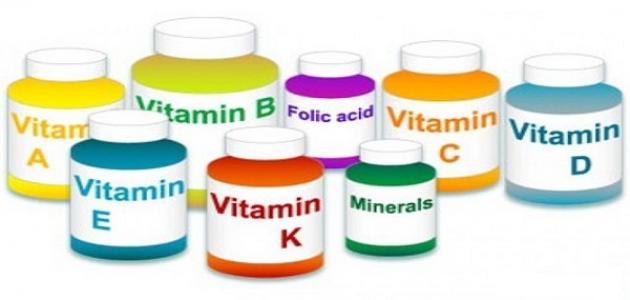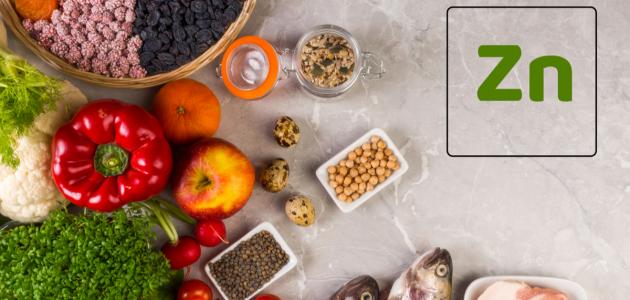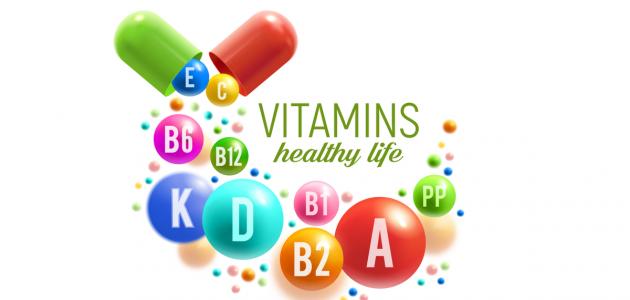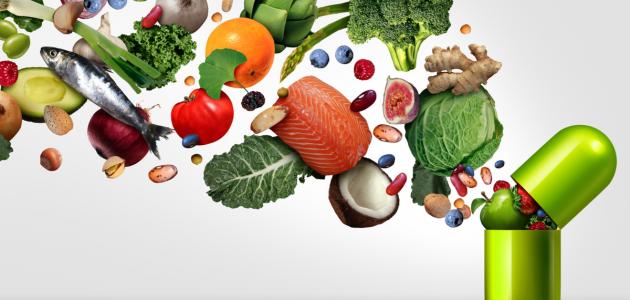Contents
Vitamin K.
The Vitamin K is a vitamin soluble in fat, which is found in all parts of the body including the liver, brain, heart, pancreas, bone, [1] discovered this vitamin coincidence in the period between 1920 and 1930; After the animals were subjected to a calorie-restricted diet, which led to excessive bleedingAnd although it is available in several types; However, the two most common types in the diet are: Vitamin K1, which is known as Phylloquinone, and its consumption accounts for 75% to 90% of Vitamin K, which is available in plant foods, such as: green leafy vegetables, and the second type It is vitamin K, which has several subtypes called according to the length of the side chain, and this type is known as Menaquinone, and this type can be obtained from fermented foods and animal foods. [2]
It is also worth noting that the beneficial bacteria in the intestine can manufacture vitamin K, but the consumption of antibiotics leads to the destruction of these bacteria, which causes a decrease in the levels of vitamin K. [3]
Vitamin K benefits according to the degree of effectiveness
Effective
- Reducing the risk of newborns developing hemorrhagic disease: Hemorrhagic disease, which is also called vitamin K deficiency bleeding, which is bleeding that occurs in children during the first few days of their lives, as children are born at low levels Of vitamin K naturally, and this vitamin is a key factor in blood clotting in them, but in the event of a decrease in its levels, this is the main cause of hemorrhagic disease in newborns, and if the child is suspected of having this disease, the doctor gives the newborn a dose of vitamin K1 And it is confirmed if the bleeding stops, but if the child is diagnosed with hemorrhagic disease, the doctor determines a treatment plan that may include blood transfusion if the bleeding is severe. [4] [5]
- Reducing the risk of bleeding in people with prothrombin deficiency: a disorder caused by a lack of prothrombin in the blood ; Which leads to problems in the clotting process , and taking vitamin K1 or injecting it intravenously can prevent or reduce bleeding problems in people who suffer from low levels of prothrombin as a result of using some drugs. [6] [7]
- Reducing the risk of bleeding in people with vitamin K-dependent clotting factor deficiency, which is a very rare inherited bleeding disorder that results from a problem with some clotting factors that need to be activated by chemical reactions to vitamin K, This negatively affects the clotting process, and therefore, taking vitamin K orally or as an injection into a vein has a great role in preventing bleeding in people with this disease. [8] [9]
- Reverse the effects of the use of warfarin to prevent blood clots: ; Defined as a drug anticoagulant , ie it reduces to be blood clots, [10] and used some vitamin products as for the treatment of bleeding complications, or liquefaction of excessive blood caused by the use of warfarin, vitamin K 1 may reduce the effect of this drug, it is worth noting To the necessity that these drugs should not be consumed together except under close medical supervision. [11]
Possibly Ineffective
- Reducing the risk of intraventricular hemorrhage, which is bleeding that occurs in the brain inside or around the ventricle in the space containing the cerebrospinal fluid . This bleeding may lead to stress and damage to nerve cells, and severe damage to these cells may lead to Irreversible brain damage [12] It has also been found that vitamin K consumption in women at risk of very early labor cannot prevent bleeding in the brain of preterm infants, in addition to it does not reduce the risk of developing nerve damage caused by this hemorrhage. [13]
There is insufficient evidence of its effectiveness
- Boosting athletic performance: Some preliminary research indicated that taking vitamin K2 by mouth might improve exercise performance by increasing heart function. [7]
- Promote bone health in people with beta -thalassemia, which is a blood disorder that reduces hemoglobin production. A protein in red blood cells contain iron , which is responsible for the transfer of oxygen to all parts of the body, [14] has shown that vitamin K 2 along with calcium and vitamin D ; It may improve bone mass in children with this disorder. [15]
- It is worth noting that vitamin K activates some types of proteins responsible for bone formation and mineralization, which is a process that enhances bone strength, and therefore not consuming sufficient quantities of this vitamin is associated with a decrease in bone density and an increased risk of fractures. [16]
- Reducing the risk of developing cataracts: , which is represented by blurring of vision, and is the most common cause of vision loss after the age of forty, and the main cause of blindness in the world, and some research has shown that the more vitamin K2 intake; Reduced risk of developing cataracts . [7] [17]
- Reducing the risk of heart disease: Vitamin K may activate a protein that contributes to preventing calcium deposits in the arteries, which is associated with an increased risk of heart disease . According to many studies, it is believed that the effect of vitamin K2 is better than the effect of vitamin K1 in reducing calcium deposits and reducing the risk of Heart disease, such as an observational observational study published in Nutrition in 2004. [18] [2]
- Improvement of the health of people with cystic fibrosis: ; It is a genetic disorder that damages the lungs , digestive system, and other organs of the body. [19] People with cystic fibrosis may suffer from low levels of vitamin K due to problems digesting fats , so their consumption of a group of fat-soluble vitamins that includes both vitamins A, vitamin D, and vitamin E , in addition to vitamin K, can improve their vitamin K levels, and other research has shown that taking this vitamin orally can enhance osteocalcin production. It plays a role in regulating metabolism, but evidence hasn't shown that it improves the overall health of people with cystic fibrosis. [13]
- Reducing cholesterol levels: Taking vitamin K2 may reduce the level of cholesterol in the blood in people who have high levels of it and are undergoing dialysis. [9]
- Reducing signs of rheumatoid arthritis: Preliminary research has shown that taking vitamin K2 with medicines for arthritis. It reduces the signs of joint swelling better than taking joint medications alone. [15]
- Reducing the risk of cancer: A study from Dokkyo Medical University in 2012 found that vitamin K2 may reduce the risk of HCC recurrence after undergoing liver resection surgery, and it may also improve the survival time of patients with liver cancer (20). ] [21] According to an 8.6-year observational study published in the American Journal of Clinical Nutrition in 2008 it was noted that vitamin K2 intake in men may reduce their risk of developing prostate cancer , but more studies are needed to confirm these results, [22] ]In addition, a laboratory study published in Breast Cancer in 2019 showed that it is possible for vitamin K2 to stimulate the apoptosis of programmed cell death of breast cancer cells through the process of autophagy that destroys these cells. Vitamin K in the death of cancer cells, depending on the type, it may lead to the inhibition of reactive oxygen species similar to free radicals in leukemia and thus programmed death. [23] Increased intake of vitamin K2 has also been shown to be linked to a reduced risk of lung cancer and death from it. [15]
- Other benefits There is insufficient evidence of effectiveness: [7]
- Reducing puffiness.
- Reducing bruising and bruising.
- Reducing spider veins.
Vitamin K sources
Eating food sources rich in vitamin K is one of the best ways to obtain it, and it can also be obtained from its nutritional supplements, and in the following detail to mention the foods that contain vitamin K: [24]
- Food sources: including:
- Green leafy vegetables, such as: kale leaves, spinach, mustard, lettuce, parsley, green lettuce, chard , kale, and some other vegetables, such as: Brussels sprouts, broccoli, cauliflower , And cabbage.
- Fish.
- Liver.
- Meat.
- eggs.
- Cereals; However, it contains less vitamin K.
- Nutritional supplements: Vitamin K is available in most multivitamin supplements, and you can also obtain supplements that contain this vitamin alone or with other foodstuffs, and it is worth noting that these supplements may contain different forms of vitamin K, including Vitamin K1 and Vitamin K2, and it is worth noting that there is a third type of industrial vitamin K, called Vitamin K3, but studies that used it showed that it caused damage to liver cells according to what was mentioned by old laboratory studies, so its use in nutritional supplements And fortified foods. [3]
To read more about sources of vitamin K, you can refer to the article Where is Vitamin K found in food .
Recommended amounts of vitamin K.
The following table shows: Adequate Intake of Vitamin K, according to age group: [3]
| Age group | Adequate intake of vitamin K in micrograms |
|---|---|
| Infants from birth to 6 months | 2 |
| Infants 7 to 12 months | 2.5 |
| Children from 1 year to 3 years | 30 |
| Children 4 years to 8 years | 55 |
| Children 9 years to 13 years old | 60 |
| Males and females from 14 years to 18 years | 75 |
| Males 19 years and older | 120 |
| Females 19 years and over | 90 |
| Pregnant and breastfeeding women from 14 to 18 years | 75 |
| Pregnant woman and infants 19 years and over | 90 |
Vitamin K deficiency
It is rare for a decrease in vitamin K levels in healthy adults. [25] As previously mentioned, there are some types of bacteria in the human body that produce this vitamin, and it is also available in many types of foods, [26] but if this deficiency is found This may increase the risk of severe bleeding, because the blood loses the ability to clot in the event of a decrease in the levels of this vitamin. [27]
To read more about deficiency of this vitamin, refer to the article What causes vitamin K deficiency .
Precautions for vitamin K consumption
Taking vitamin K in its forms (K1 and K2) by mouth or injecting it into a vein as appropriate is often safe , although most people do not experience any side effects when consuming it in the recommended daily amount. However, some people may suffer from an upset stomach, or diarrhea, and it should be noted that attention should be paid when consuming vitamin K in some cases, which includes the following: [9]
- Pregnant and breastfeeding women: Vitamin K is safe for pregnant and breastfeeding women if it is taken in the recommended amount daily, and high amounts should not be used without consulting a healthcare professional.
- Children: It is often safe for children to take vitamin K1 by mouth or inject it .
- Diabetics: Vitamin K1 may lower the level of blood sugar, so blood sugar levels must be monitored when taking it by diabetics.
- Kidney patients: Taking vitamin K in large quantities may be harmful to a kidney patient who is undergoing hemodialysis treatment.
- People with liver disease: high doses of vitamin K may aggravate their clotting problems.
- Decreased bile secretion: People who suffer from decreased bile secretion and who take vitamin K may need to take bile salts supplements to ensure absorption of this vitamin.
Drug interactions
Be careful when using vitamin K with some types of medicines, including the following:
- Warfarin: ; The interaction between it is classified as major , as warfarin is used to slow blood clotting, and this opposes the role of vitamin K; Which contributes to blood clotting, and therefore vitamin K may reduce the effect of this drug, and therefore blood should be checked regularly, and pay attention to the dose consumed from it. [13]
- It is worth noting that aspirin may also increase the risk of bleeding, and therefore you should consult your doctor to find out whether it is better to continue taking it or to stop it if you consume vitamin K supplements. [28]
- Blood sugar lowerers: , as this interaction is classified as moderate (Moderate), and therefore the consumption of these drugs with vitamin K may lead to a significant decrease in the level of blood sugar , and this requires careful and frequent examination of sugar, with Possibility of changing the dose consumed. [13]
Common questions about vitamin K.
Are vitamin K supplements safe for older adults?
Elderly people are more likely to have osteoporosis and bone fractures, so they should pay attention to eating enough vitamin K, and experts generally recommend that adults take multivitamin supplements once a day, with at least one cup of Green leafy vegetables daily. It should be noted that a multivitamin supplement usually contains between 10-25 micrograms of vitamin K. [29]
Why is vitamin K important for children?
All newborn infants have low levels of vitamin K, because they do not have sufficient quantities of the beneficial gut bacteria that make vitamin K, and breast milk contains small amounts of this vitamin, and therefore it is recommended that children be given one injection intramuscularly injection) after birth to protect them from deficiency. [30]
References
- ↑ "Vitamin K" , www.hsph.harvard.edu , Retrieved 27-11-2019. Edited.
- ^ A b Keith 's Pearson (15-9-2017), " the Vitamin Vs the K1 the K2: What ' 's The Difference?" , Www.healthline.com , Retrieved 27-11-2019. Edited.
- ^ A b t "K the Vitamin" , Www.ods.od.nih.gov , (10-7-2019), Retrieved 30-11-2019. Edited.
- ↑ “Hemorrhagic Disease of the Newborn Symptoms & Causes , ” www.childrenshospital.org , Retrieved 27-11-2019. Edited.
- ↑ Sandy Rice (11-5-2016), "Hemorrhagic Disease of Newborn" , www.healthline.com , Retrieved November 27 , 2019. Edited.
- ↑ Todd Gersten (29-1-2019), "Prothrombin deficiency" , www.medlineplus.gov , Retrieved November 27 , 2019 . Edited.
- ^ A b t w Therapeutic Research The Faculty (2018), "VITAMIN K" , the www.webmd.com , Retrieved 27-11-2019. Edited.
- ↑ "WHAT ARE RARE CLOTTING FACTOR DEFICIENCIES?" , Www1.wfh.org , (2009), Retrieved 27-11-2019. Edited.
- ^ A b t "K the Vitamin" , Www.emedicinehealth.com , (17-9-2019), Retrieved 27-11-2019. Edited.
- ↑ "Warfarin" , www.drugs.com , Retrieved 3-1-2020. Edited.
- ↑ "Drug Interactions between Vitamin K and warfarin" , www.drugs.com , Retrieved 27-11-2019.
- ↑ “Intraventricular Hemorrhage Symptoms & Causes , ” www.childrenshospital.org , Retrieved 27-11-2019. Edited.
- ^ A b t w "VITAMIN K" , Www.rxlist.com , (17-9-2019), Retrieved 27-11-2019. Edited.
- ↑ "Beta thalassemia" , www.ghr.nlm.nih.gov , 11-26-2019 , Retrieved 28-11-2019. Edited.
- ^ A b t "K the Vitamin" , Www.medicinenet.com , (17-9-2019), Retrieved 28-9-2019. Edited.
- ↑ "Do You Need Vitamin K Supplements for Your Bone Health?" , www.health.clevelandclinic.org , Retrieved 3-1-2020. Edited.
- ↑ Gretchyn Bailey (6-2019), “Cataracts: 3 common types, causes, symptoms and treatments , ” www.allaboutvision.com , Retrieved November 29, 2019 . Edited.
- ↑ Johanna Geleijnse, Cees Vermeer, Diederick Grobbee And Others (11-2004), “Dietary Intake of Menaquinone Is Associated with a Reduced Risk of Coronary Heart Disease: The Rotterdam Study” , The Journal of Nutrition , Issue 11, Folder 134, Page 3100--3105. Edited.
- ↑ “Cystic fibrosis , ” www.mayoclinic.org , (9-7-2019), Retrieved 11-30-2019. Edited.
- ↑ MITSURU ISHIZUKA, KEIICHI KUBOTA, MITSUGI SHIMODA And Others (12-2012), "Effect of Menatetrenone, a Vitamin K2 Analog, on Recurrence of Hepatocellular Carcinoma after Surgical Resection: A Prospective Randomized Controlled Trial" , Anticancer Research , Issue 12 32, Page 5415-5420. Edited.
- ↑ Joe Leech (21-9-2018), “Vitamin K2: Everything You Need to Know” , www.healthline.com , Retrieved 28-11-2019. Edited.
- ↑ Katharina Nimptsch, Sabine Rohrmann, Jakob Linseisen (4-2008), “Dietary intake of vitamin K and risk of prostate cancer in the Heidelberg cohort of the European Prospective Investigation into Cancer and Nutrition (EPIC-Heidelberg)" , the american journal of clinical nutrition , Issue 4, Folder 87, Page 985--992. Edited.
- ↑ Shinsuke Miyazawa, Shota Moriya, Hiroko Kokuba And Others (10-17-2019), “Vitamin K2 induces non-apoptotic cell death along with autophagosome formation in breast cancer cell lines” , Breast Cancer , Page 1-11. Edited.
- ↑ Emily Wax (2-2-2019), "Vitamin K" , www.medlineplus.gov , Retrieved 11-30-2019. Edited.
- ↑ Renata Górska "Vitamin K Deficiency" , www.sciencedirect.com , Retrieved 4-1-2020. Edited.
- ↑ Barbara Delage (7-2014), "Vitamin K" , www.lpi.oregonstate.edu , Retrieved 5-1-2020. Edited.
- ↑ Bethany Cadman (23-12-2017), “Vitamin K deficiency: What you need to know” , www.medicalnewstoday.com , Retrieved 4-1-2020. Edited.
- ↑ "Vitamin K1 Ampul" , www.webmd.com , Retrieved 3-1-2020. Edited.
- ↑ "Micronutrients for Older Adults" , www.lpi.oregonstate.edu , Retrieved 3-1-2020. Edited.
- ↑ "Vitamin K For Newborn Babies To Prevent Serious Bleeding" , www.kidshealth.org.nz , Retrieved 1-1-2020. Edited.
